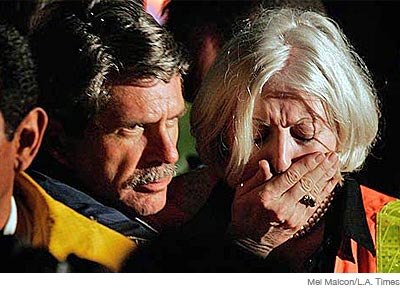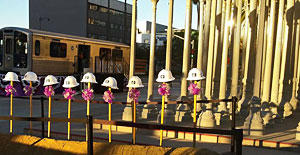The wreckage beyond the crash
September 1, 2008
It’s been more than a week since the Metrolink crash and I’m still haunted by Beckie Pompel.
I met her at Chatsworth High School well past midnight on that horrible Friday night, September 12. She was among more than 100 people who’d gathered there in gut-wrenching uncertainty, awaiting word on the fate of loved ones whose names were missing from lists of the injured. There was despondency, and there were tears.
I’d arrived at the school after spending hours at the scene of the head-on collision. There, amid the overpowering smell of diesel fuel, I witnessed first-hand the heroic response of an army of firefighters and law enforcement officers as they clawed through the tangled debris, where 25 Metrolink commuters perished.
At one point, when the flag-draped body of uniformed LAPD officer Spree Desha was lifted from the train, I watched the firefighters halt their grim work. With helmets off, they sat motionless atop the Metrolink’s toppled first passenger car, as though the magnitude of what they’d been doing since early evening had finally sunk in.
For me, I could think only of how that single tragedy was being multiplied across two dozen other families, of the fragile and fleeting nature of life—thoughts that would become even more overpowering in the hours ahead at Chatsworth High.
When Sheriff Lee Baca first asked me to accompany him to the school, I was reluctant. I didn’t want to deal with the immense grief I knew would be awaiting us. However, I also thought that perhaps I could provide a measure of comfort, that maybe I could hold someone’s hand or put an arm around a shoulder. So, despite my anxiety, I went.
Over the years, I’ve seen too many fatal disasters—plane crashes, fires, floods, earthquakes, even the last Metrolink crash in Glendale. Yet none of them, not even this accident, had the emotional impact of what I’d encounter at Chatsworth High, with scores of distraught people praying for the best but fearing for the worst. Many had been waiting for news about their families and friends for eight hours. They were increasingly anxious, despite the best efforts of our fine County mental health specialists and the L.A. city volunteers who’d been dispatched to the school.
Beckie Pompel seemed to be an exception.
When I arrived, the 63-year-old wife of Metrolink passenger Howard Pompel recognized me and immediately introduced herself. She was kind and open, and she instantly put me at ease. As we shook hands, she told me she was reasonably optimistic that her husband had survived the crash, even though there was no record of him being transported to a hospital. He always rode in the last car, the safest one. He’ll turn up, she said.
My heart sank. I couldn’t be as upbeat. A few hours earlier, I’d been told by fire officials that two commuters, whom they did not identify, had in fact died in that final car. I gamely encouraged her to keep praying but, in my gut, I had a sinking feeling that she was never going to see her husband again.
That night, after getting home in the wee hours, I couldn’t sleep. I kept thinking about all those shattered lives and about Beckie Pompel. I felt a bond with her. And, like her, I wanted to believe.
Sometime after 4:00 a.m., the names of the fatalities began to trickle in. When I first saw the list, I quickly searched for Howard Pompel, hoping beyond hope his name wasn’t there. But it was. The discovery sucked the air out of me. I knew that the smiling, optimistic face I’d seen only hours earlier was now gone, replaced by grief and anguish over the loss of a 69-year-old husband, the father of three, a grandfather of five.
I know that the public is often cynical about why politicians dash to the scenes of calamitous events, as I did on that tragic Friday night. The rap is that we’re just looking for publicity and visibility. In some cases, that cynicism is justified.
I can only speak for myself: Throughout my political life, I’ve made it a practice to get out of the comfort zone of my Civic Center office and into the communities I serve. In my experience, this is the only way to get unfettered and unfiltered information on the performance of our government agencies. What’s more, County workers on the front-lines have told me that they appreciate the show of support. We are, after all, on the same team.
Maybe more important, in times of tragedy I have the chance to see and feel the real-life struggles that people confront, to develop a level of empathy that can’t be achieved by reading the statistical reports and charts that move across my desk.
To me, this deeper understanding of the kind of pain suffered by Beckie Pompel and so many others like her is essential to my service as an elected official. Sure, we’ll learn from this tragedy. We’ll plug the safety gaps that were exposed in this accident. Rules will change, new regulations will be imposed and investments in new technology will be made. The sooner the better.
But more than anything else, I’m motivated by an unconditional commitment to never having to look another Beckie Pompel in the eye.










 Check for the latest closure information
Check for the latest closure information








